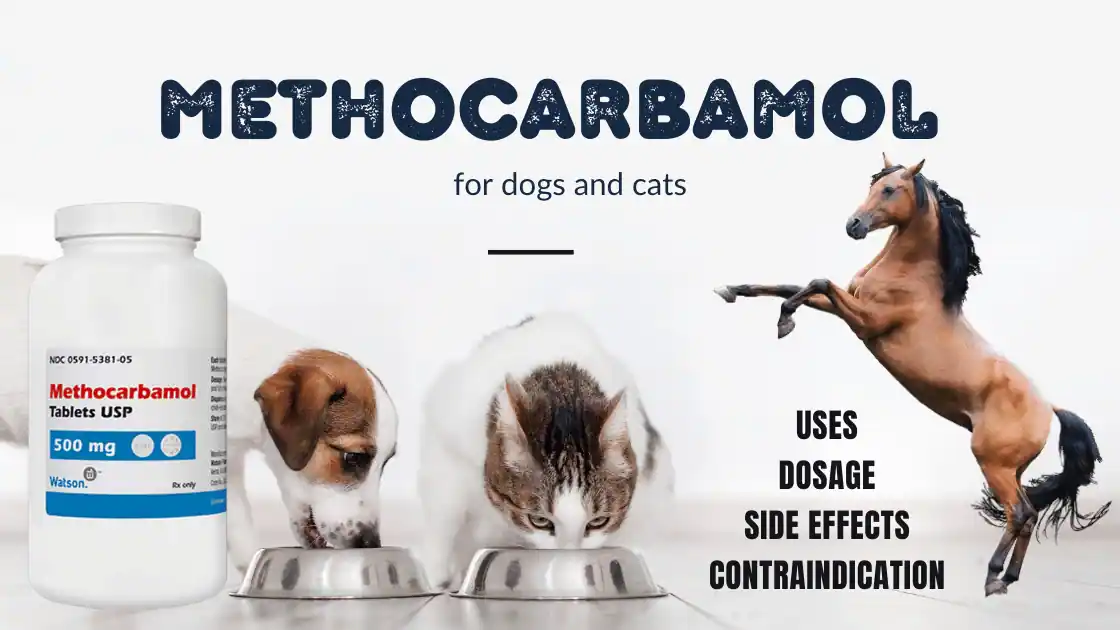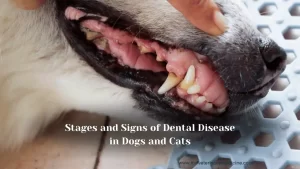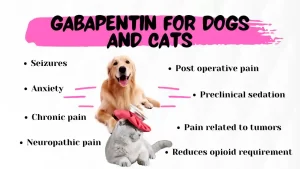As a veterinarian and pet parent, you might constantly look for ways to help your furry friends feel better and recover from illness or injury. Methocarbamol is a muscle relaxant that is commonly used in dogs, cats and horses. It helps in the many clinical conditions causing muscle spasticity like myositis, sprain, IVDD, tetanus and poisoning etc. It is a regulated drug and not available without prescription by a registered veterinary practitioner.
What is methocarbamol?
Methocarbamol is a guaifenesin derivative (carbamate) which is a CNS depressant with sedative and musculoskeletal relaxant properties. It is often used in conjunction with other pain relievers like NSAIDs or corticosteroids, to help manage pain and discomfort. It is also approved for use in horses (intravenous mainly).
How it works?
No fully established mechanism of action. It has no direct action on the contractile mechanism of skeletal muscle, the motor endplate or the nerve fibre. It interrupts abnormal nerve impulse and diminishes skeletal muscle hyperactivity. But it does not affect the contractile mechanism of muscles. It shows effect in 1-2 hours after oral administration.
It is metabolised in the liver and eliminated from body through kidneys. During first pass metabolism in liver it is converted in guaifenesin which is detectable in serum or plasma. That’s why withdrawal periods are necessary in horses before participation in sports.
It does not affect the smooth muscles of the body present in intestines and bladder (no drug related incontinence).
Usage:
Methocarbamol does not treat the underlying condition or poisoning but it reduces the effects of these on muscles. It is used in following conditions of dogs and cats:
- Intervertebral disc disease (IVDD) – In this case intervertebral discs become compressed or herniated. This herniated disc puts pressure on the nerves in the spinal cord, which causes pain and discomfort. Methocarbamol can help to reduce muscle spasms and relieve pain in dogs and cats that are suffering from IVDD.
- Toxicity (pyrethroid, strychnine or rat poison, metaldehyde) – it is helpful in the muscle relaxation for management of common poisoning like pyrethroids and strychnine in dogs and cats.
- Muscle inflammations or Traumatic muscle strains – Muscle strains and sprains are common injuries in dogs and cats. Methocarbamol can be used to reduce muscle tension and help the animal to recover more quickly from these injuries.
- Arthritis – Arthritis causes inflammation and pain in the joints. In this case it can be used to reduce muscle tension and relieve pain in dogs and cats that are suffering from osteoarthritis.
- Post-Operative Pain – Methocarbamol can be used to help manage pain and discomfort in dogs and cats that have undergone surgery. By reducing muscle tension, methocarbamol can help to alleviate pain and make the recovery process more comfortable for the animal.
- Exertional rhabdomyolysis or tying up (Horses)
- Treatment of tetanus – also known as lock jaw. Helps in reducing muscle spasm.
- Muscular spasm and tremors
- Spinal cord disorders and Spinal cord injuries
- Convulsions / epilepsy
- Permethrin poisoning in cats
Other supportive medications are also advised as a part of treatment like penicillin for tetanus, pain killers, joint supplements etc accordingly.
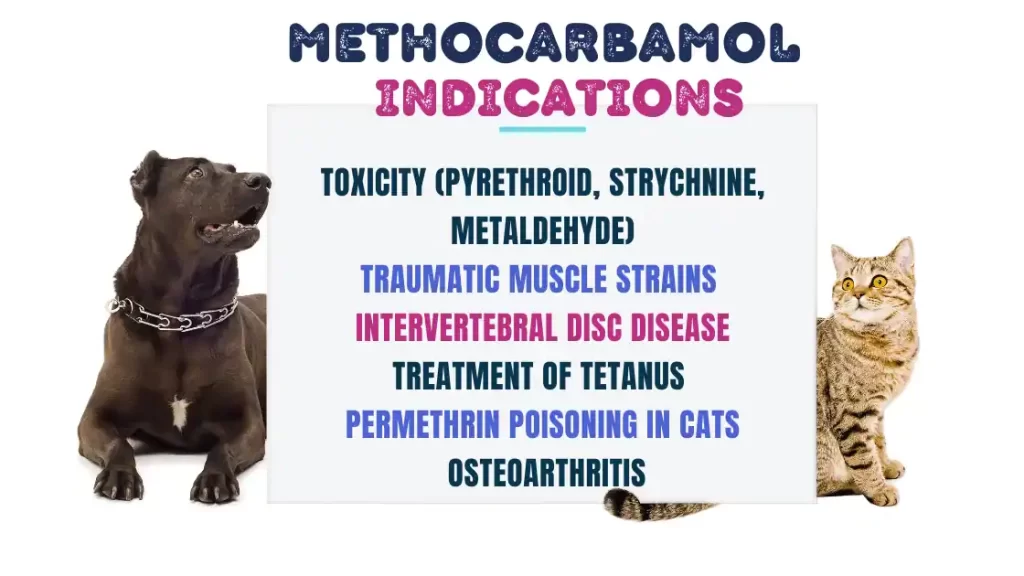
Dosage / doses:
The dosage of methocarbamol depends on different factors, including the bodyweight of the animal, the severity of the condition being treated, and any other concurrent. It is important to follow the dosage instructions provided by your veterinarian. Carefully ensure that the animal receives the correct amount of medication. Dose can be adjusted based on the animal’s response to the treatment or therapy.
Dogs and Cats: 20–45 mg/kg body weight every 8 to 12 hours orally.
Horses: Moderate conditions 4.4-22 mg/kg and severe conditions 22-55 mg/kg bodyweight intravenous 8 hourly;
Usually in general 15-25 mg/kg IV slowly until effect.
Even higher dosage may be required for treatment of tetanus. Do not exceed dose rate 330 mg/kg/ day.
Can be given with food or empty stomach. In case of vomition if given empty stomach then prefer after or with meals to reduce nausea and easy administration. It is well tolerated orally in dogs and cats. In case of a missed dose do not overdose and give next dose at scheduled time.
Injectable formulations are also available and should be given at slow rate along with intravenous fluids like physiological saline solutions. Onset of effect is quick / rapid in this case so monitoring is necessary.
Brand names:
Robaxin-V, Robaxin-750, Robaxin, Robinax, Robaximol,
500 mg or 750 mg tablets
100 mg/ml injections
Contraindications:
Should be used with utmost care in animals with history or suffering from liver or kidney issues. Do not give in case of known hypersensitivity. Observe for the signs like intense itching, skin rashes, seizures, or difficulty in breathing in case of serious allergic reaction.
Safety in pregnant and nursing pets have not been established.
Adverse reactions or side effects of methocarbamol:
Serious toxicity or death has not been reported after overdoses of methocarbamol in dogs. In recent overdosing gastric lavage or vomition can be attempted if animal is conscious.
Commonly observed signs of adverse reaction are hypersalivation, emesis, lethargy, weakness and ataxia (incoordination) due to muscle relaxation. Change in urine colour can be noticed in some pets which is normal. These are more observed in dogs receiving higher doses of medication. These side effects are does dependent and disappear as the medicine wear off.
Serious side effects such as seizures or liver damage are rare cases. In case of extravasation of injectable solution, it may cause local tissue inflammation or necrosis.
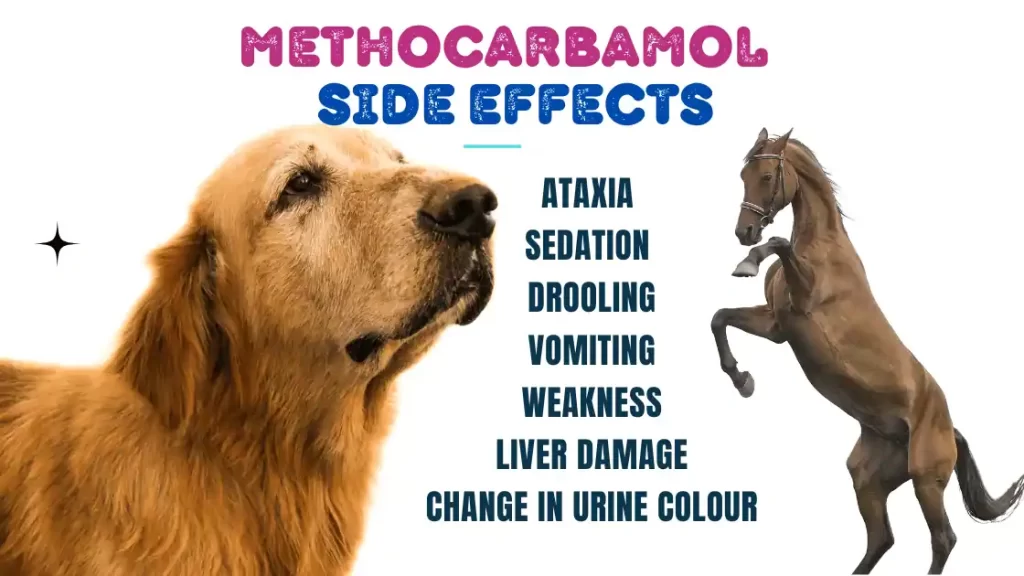
Drug interactions:
As methocarbamol is a CNS depressant and may show additive or amplified CNS depression when given with other CNS depressing agents or muscle relaxants (Dantrolene, Baclofen, Guaifenesin etc.). Use with caution when given in combination with the buprenorphine, anticholinergics, mirtazapine, and SSRIs (selective serotonin reuptake inhibitors).
Methocarbamol can be safely be combined with NSAIDs (non-steroidal anti-inflammatory drugs) and steroids. Other pain killers like trazodone, gabapentin can also be used along with it to achieve multimodal analgesia.
Storage:
Can be stored at room temperature (between 20-25°). This is also a human prescription medication so keep away from children and pets.
Conclusion:
Methocarbamol is a useful prescription only drug that can help in managing pain and discomfort in dogs and cats that are suffering from a variety of conditions related to muscle spasms and tension. By reducing muscle tension, it can help to alleviate pain and make the recovery process more comfortable for the animal.
Methocarbamol can be given safely for long term to the dogs and cats. It is also important to note that methocarbamol is not a cure for any of the conditions such as IVDD, arthritis, muscle strains and sprains, and post-operative pain etc. or listed above. It is a management tool that can help to reduce symptoms and improve quality of life. As with any medication, it is important to only use methocarbamol under the guidance and supervision of a veterinarian.
FAQs (Frequently asked questions)
What is methocarbamol for dogs?
Methocarbamol is a CNS depressant with sedative and musculoskeletal relaxant properties.
What is methocarbamol used for in dogs?
It is commonly used for the treatment / management of Intervertebral disc disease (IVDD), rat poison toxicity, muscle injuries, arthritic pain, postoperative pain, tetanus, and convulsions etc in dogs.
Is methocarbamol the same for dogs and humans?
Yes, but formulations may contain preservatives or excipients not safe for human use or vice versa. Some human preparations may contain paracetamol or diclofenac sodium also which may not be safe for long term use in dogs.
Can humans take methocarbamol for dogs?
Avoid consuming pet medications. In case of accidental consumption please contact a nearby poison control centre or physician immediately.
Is it ok to take methocarbamol with gabapentin for dogs?
Yes, it can be combined with gabapentin for effective pain management therapy.
Is methocarbamol safe for dogs?
Yes, it can be safely used in dogs but some side effects like ataxia, weakness, lethargy can be noticed in some dogs.
What does methocarbamol do for dogs?
It affects the nerve impulses and reduces skeletal muscle activity.
Can methocarbamol and tramadol be taken together for dogs?
Yes. Dogs on methocarbamol can be given tramadol for effective pain management.
Does methocarbamol for dogs help in pain?
Yes, It can be used for arthritic, traumatic and IVDD related pain in dogs.
How much methocarbamol for a dog?
A 10 kg dog can take from 200 to 450 mg of methocarbamol tablet. Doses increment should be on the response of the therapy.
How much methocarbamol is lethal for dogs?
Doses more than recommended or serious side effects can be lethal for dogs.
How to order robaxin methocarbamol for dogs online?
It is a prescription only medicine and requires a prescription form registered veterinary practitioner. Due to possible legal restrictions and drug abuse.
Is methocarbamol 500mg tab safe for dogs?
Yes. It can be safely given to a 15-20 kg dog . Dose will depend on the ailment and response to the therapy
Disclaimer: This article has been written for information purpose and must not be used as a substitute of veterinarian’s advice. Literature has been reviewed for reference purposes.


